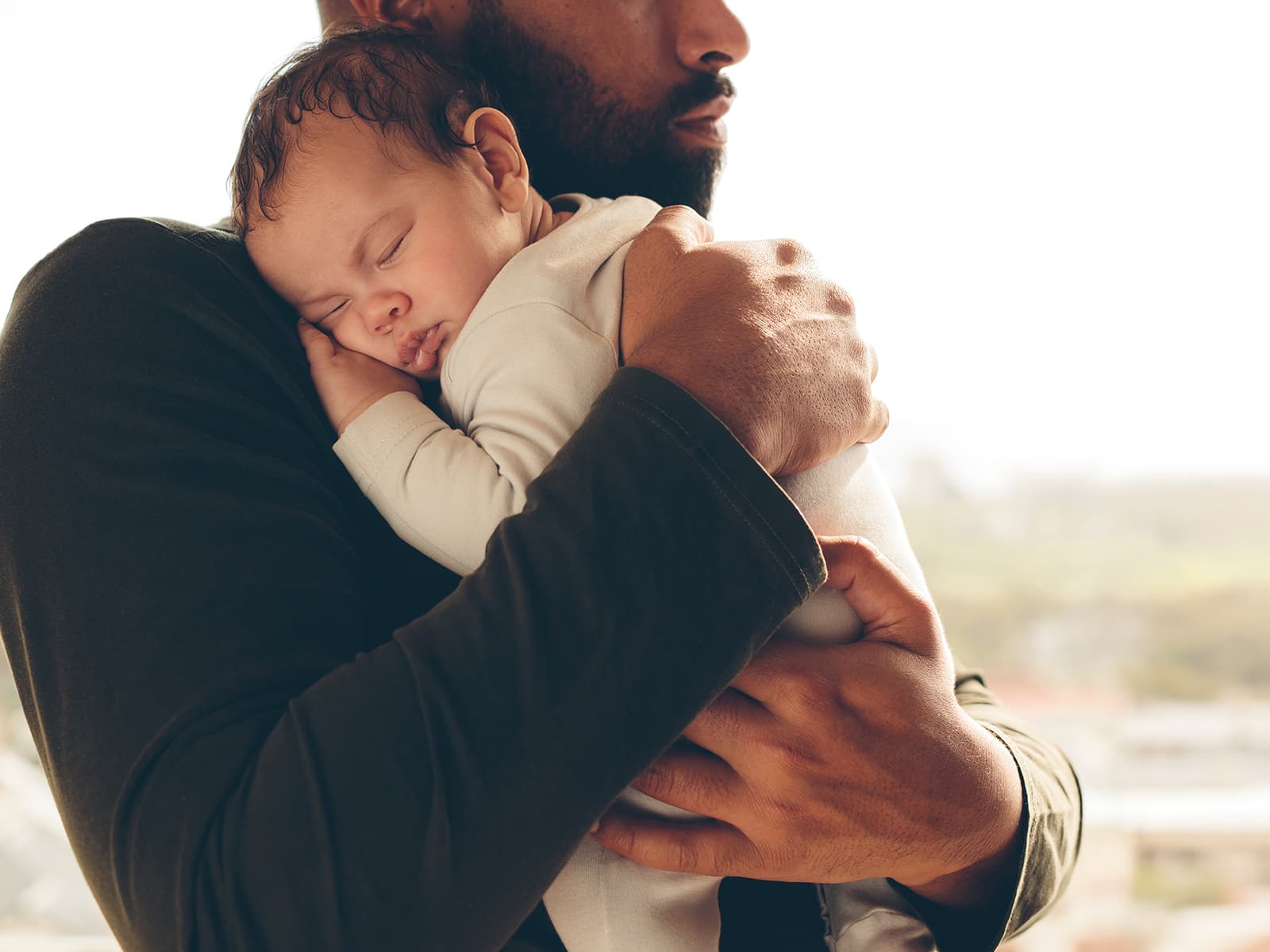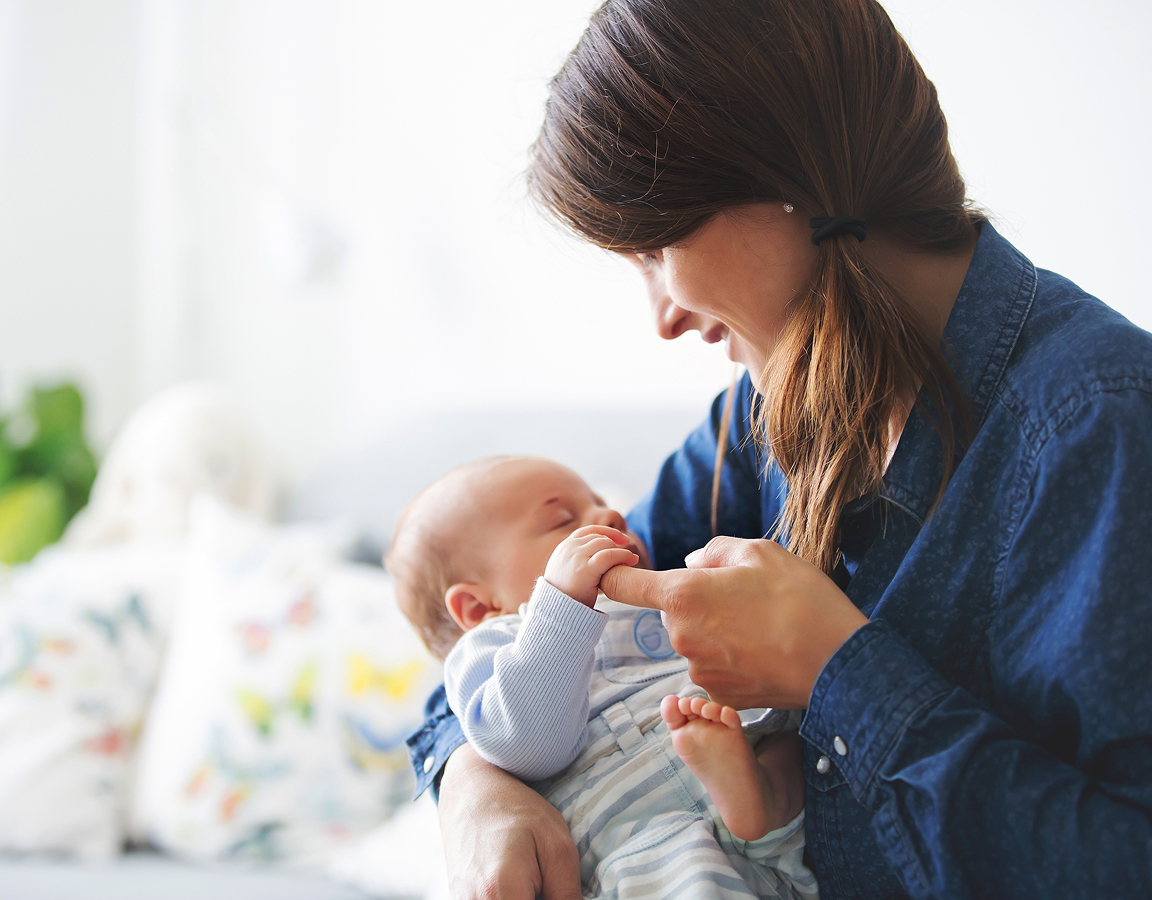
Health Tips
When Your Baby Gets Sick: A Practical Guide for New Parents
Becoming a parent means stepping into a world of firsts — first smiles, first steps, and, inevitably, your baby’s first cold or fever.
So how do you know what’s “normal,” when you should call your pediatrician, or even go to the ER? This guide combines evidence based recommendations from pediatric experts with insights from Certified Primary Care Pediatric Nurse Practitioner Ariel Shagena at Zarminali Pediatrics to help you navigate your baby’s first illness with confidence.
What to Do When Your Baby Gets Sick for the First Time
It’s Normal (and Expected) for Babies to Get Sick
Newborns look tiny and fragile, so parents often feel alarmed when their little one comes down with a runny nose or fever. Ariel reassures families that “it’s very common for babies to get sick, even multiple times in the span of a couple months, especially in the fall and winter.”
Healthy children in childcare can experience 8–12 colds in their first year because there are so many respiratory viruses circulating. Each exposure helps build immunity, and by toddlerhood those colds become less frequent.
Understanding the 2–3-Month Milestone
A newborn’s immune system is still learning and rapidly developing in the first 8–12 weeks. During this time, babies rely on antibodies passed from their mother during pregnancy and through breastmilk if they’re breastfed. After two to three months, a baby’s immune system can better fight off viruses and bacteria.
That’s why pediatricians pay close attention to age when evaluating a sick infant. Ariel explains that babies younger than two months have “an underdeveloped immune system,” and a fever in that age group warrants immediate medical attention. After two to three months, clinicians have a bit more flexibility to monitor symptoms and might manage an uncomplicated fever in the clinic rather than the emergency room.
Is It Ever “Too Soon” for Your Baby to Get Sick?
Parents sometimes wonder whether a newborn can be “too young” to catch a cold. In reality, babies can encounter viruses from their first days, especially if they have older siblings, attend daycare or are born during respiratory virus season (fall and winter).
Baby’s First Fever: What’s Normal and When to Worry
What Counts as a Fever?
A fever is a body temperature over 100.4 °F. In most cases a fever is the body’s natural way of fighting infection and is not itself harmful. But the significance of a fever depends on your baby’s age:
- Under 2 months old: A fever of 100.4 °F or higher is an emergency. Call your pediatrician immediately and take your baby to the nearest emergency room. Young infants lack a robust immune response and require tests to rule out serious bacterial infections.
- 2–6 months old: Notify your pediatrician right away. They can help you determine if your baby should be seen in their office or if they should go to the emergency room. It may depend on your baby’s symptoms and history (e.g., being premature or having a health condition). Fevers in this age group often result from viruses, but an evaluation helps determine whether further workup is needed.
- Over 6 months: If your child is up to date on vaccinations and otherwise acting well — eating, drinking and smiling — you can monitor the fever at home. Seek care if the fever persists for more than 24 hours, or if your child hasn’t received all recommended vaccinations.
A child with an extremely high fever (105 °F or higher) should go to the ER right away at any age.
The number on the thermometer isn’t the only sign of how sick a child is. A moderate fever with lethargy, difficulty breathing, dehydration or a persistent rash is more concerning than a high fever in a child who is drinking and playing.
Newborns can also show infection through a low temperature or behavior changes (for example, lethargy, reduced feeding or change in skin color). If anything worries you, call your pediatrician — they’d rather hear from you than have you wait.
How to Check Your Baby’s Temperature Properly
Rectal thermometers are most accurate for babies and children up to three years old. But if you’ve never used one before, ask your pediatrician at one of your newborn visits.
If you don’t have a rectal thermometer, the next best option is a thermometer you use under the armpit. Though it’s not as accurate as a rectal thermometer, it’s better than ear or forehead versions.
Can You Give a Baby Medicine for Fever?
Ariel reminds parents that fevers are a natural immune response. If your child is otherwise comfortable, you don’t have to “treat the fever” just to lower the number.
For babies under six months, do not give any fever medicine at home unless instructed by a doctor. Acetaminophen (Tylenol) and ibuprofen (Motrin) can be given to children over six months if they seem uncomfortable. Always follow the dosing instructions and use the dropper that comes with the medicine. Aspirin should never be given to children.
What Illnesses Are Common in the First Year
Colds and Upper Respiratory Infections
Colds are the most common illness babies experience and are caused by many different viruses.
Cold symptoms include:
- Runny or stuffy nose
- Cough
- Discharge that may start clear and turn yellow or green
- A mild fever
Most healthy children get multiple colds in their first year. Each cold helps build immune memory. Because colds are viral, antibiotics don’t help. Supportive care (nasal saline, suctioning, hydration and rest) can make your baby more comfortable.
Flu
Influenza often feels like a very bad cold with higher fever and body aches. Babies with the flu tend to be sicker and more lethargic than those with a routine cold.
If you suspect your baby has the flu, call your pediatrician — especially if your baby is younger than six months. They may suggest antiviral medication and monitor to make sure it doesn’t lead to complications like pneumonia. Antiviral medications work best when started within 48 hours of symptoms starting, so come in within the first two days.
Flu vaccines for parents, caregivers and the baby (starting at six months) can prevent severe cases and complications.
RSV (Respiratory Syncytial Virus)
RSV is a common virus that can be dangerous for infants, especially those under six months. RSV can progress to bronchiolitis or pneumonia and leads to tens of thousands of hospitalizations in U.S. children each year.
Early RSV symptoms include:
- Runny nose
- Decreased appetite
- Cough
In very young babies, the only signs may be:
- Irritability
- Decreased activity
- Pauses in breathing (apnea)
Seek emergency care if your baby has difficulty breathing, refuses to drink or shows worsening symptoms. To protect against severe illness, the CDC now recommends mothers receive RSV vaccination during pregnancy or babies get an RSV vaccination.
Gastrointestinal Viruses
Stomach bugs can cause vomiting, diarrhea and dehydration. Most viral diarrhea resolves on its own; the main risk is fluid loss. “Try to keep your baby hydrated with breastmilk, formula or an unflavored electrolyte drink like Pedialyte, rather than plain water,” advises Ariel.
In babies, watch for signs of dehydration:
- Decreased urine (no wet diaper for more than six hours)
- Dry mouth
- Absence of tears when crying
If your baby shows signs of dehydration, go to the ER for an evaluation and to get IV fluids.
Will Illness Affect Their Development?
Most common childhood illnesses do not affect longterm development. In fact, normal viral infections help the immune system mature.
However, severe infections such as meningitis or complications of RSV can have consequences, which is why timely care and preventive measures like vaccination and hand hygiene are vital. If you have concerns about your child’s development after an illness, discuss them with your pediatrician.
When to Go to the Emergency Room
Use these guidelines and trust your gut. Seek emergency care for your baby for any of these scenarios:
- Fever in babies under two months – 100.4 °F or higher
- Extremely high fever at any age – 105 °F or higher warrants an immediate ER visit
- Trouble breathing or wheezing – watch for their ribs pulling in, noisy breathing or rapid breathing, or lips turning blue
- Signs of dehydration – fewer wet diapers (none in 6+ hours), dry mouth or absence of tears
- Persistent vomiting or diarrhea – vomiting three or more times or severe diarrhea (10 or more watery stools in 24 hours)
- Worsening or unusual symptoms – list symptoms such as rash, stiff neck, seizures or your baby just “not acting right.”
Be prepared to share your baby’s age, vaccination status, and how you measured the temperature. They’ll ask you to describe symptoms, how long they’ve been present, and any changes in feeding, urination or behavior.
Home Remedies and Getting Rest: What Actually Helps a Sick Baby?
Comfort Measures for Colds and Congestion
“A lot of times, your baby needs comfort care,” says Ariel. “You can help them through the worst of their colds until their body learns to fight them off.”
Pediatric experts agree that simple supportive care makes the biggest difference.
- Nasal saline and suction: Help your baby breath easier when they’ve got a stuffy nose. Use 1–2 drops of saline in each nostril to loosen mucus. Then suction it with a bulb syringe or nasal aspirator.
- Cool-mist humidifier: Add moisture to dry air to ease your baby’s breathing. Humidifiers can help thin nasal mucus. Sitting in a steamy bathroom with the shower running can also help.
- Hydration: Offer extra breast milk, formula or unflavored electrolyte drinks frequently to prevent dehydration. Fluids also thin mucus and loosen phlegm. If your baby is on solids, don’t worry if their appetite decreases; hydration matters most.
- Holding upright: Congested babies breathe easier when they’re held upright. Elevate their head when you hold them.
- Lukewarm bath: A lukewarm bath can help bring down fevers. Avoid cold baths, as shivering can make their symptoms worse.
- Extra snuggles: Many babies want extra snuggles or prefer to sleep upright in your arms when they’re sick. Respond to their cues and use safe sleeping practices. For example, let them nap on your chest while you’re awake, but don’t sleep with them overnight.
“Over-the-counter children’s cough medicines are often not as helpful as marketed and may not be safe for infants” Ariel points out. “So ask your pediatrician before using them.”
When Will They Feel Better?
Most fevers last two to three days, nasal discharge one to two weeks, and coughs two to three weeks. If symptoms worsen or linger beyond these timelines, check in with your pediatrician.
Why Vaccination Status Matters: Tell Your Clinician
How you choose to vaccinate your child is a factor in treating early illnesses. Vaccination status is something pediatricians consider when deciding whether they are comfortable watching and waiting or whether a more immediate workup is needed.
“Many of the vaccine-preventable diseases are most dangerous in children under two years,” says Amanda Furr, MD, Chief Medical Officer, Zarminali Pediatrics. “A fever in an unvaccinated infant could be a sign of a serious bacterial infections that requires further testing.”
Whether you’re seeing your pediatrician or visiting your nearest urgent care or ER, make sure they know your child’s vaccination status so they can choose the best course of care for your baby.
Remember that vaccines are one of the most effective tools we have to protect infants from severe illnesses. If you have questions about the infant vaccination schedule, discuss them with your pediatrician — they’re there to partner with you, not judge you.
Get Support from Sick Days to Well Visits
Watching your baby experience their first illness can feel overwhelming, but you are not alone. Remember that most childhood illnesses are part of normal immune development. With the right support and preparation, you’ll gain confidence to care for your child through sniffles, fevers and beyond. And each time your baby recovers, you’ll see just how resilient both of you can be.
Navigating a child’s first illness is easier when you have a trusted pediatrician on your side. Zarminali Pediatrics offers families and their children comprehensive pediatric care, including sameday sick visits, preventative services and telemedicine consultations. If you’re looking for a caring partner who will answer your questions, reassure you through those middleofthenight fevers and celebrate your child’s milestones, consider scheduling an appointment with one of our clinicians.
Respect your intuition and never hesitate to ask for help. Call your pediatrician with questions like: “Does my child need to be seen today?” or “At what point should I go to the emergency room?” There are no silly questions when it comes to your child’s health.













